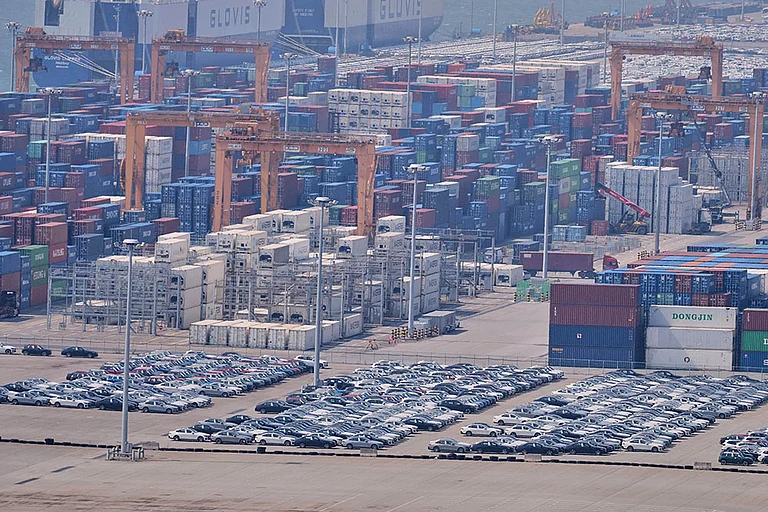
Workers in the diamond industry are facing mass layoffs as a 50 per cent tariff takes effect.
Krish Diam, a company based in Katargam, Surat, reportedly laid off over 150 diamond workers on Monday without notice.
Workers and the diamond workers’ union are seeking the government’s intervention to secure employment, but have yet to receive any relief from the government.
Two days before the 50 per cent Trump tariff takes effect from August 27, workers in the diamond industry in Surat have started facing unemployment. Over 150 ratnakalakar (diamond workers) are laid off by the ‘Krish Diam’ company based in Katargam in Surat on Monday, sources told Outlook.
Workers were asked to go on ‘indefinite leave’ after completion of their tranche of cutting-polishing work scheduled for Monday (August 25), we are told by some of the workers.
“Uoos din ka sara jitna kam baki tha vo karwa liya or phir bola ki aaj se chhutti pe jao. Ab ham kaha jaye or kaise apna pet bhare, koi aur kam bhi nahi mil raha hai (They made us complete the pending work scheduled for that day (Monday) and asked us to go on leave, now where will I go and how will I survive?” says Vinesh Kholkiya, 24, who is laid off by the Krish Diam company.
Kholkiya used to work with this company for 5 years, earning around Rs 25,000 a month. He is the sole breadwinner for his elderly mother, father, and brother. He pays an EMI of Rs 20,000 for his home loan. “I feel extremely anxious about how I will repay my loan, and ahead of festivals like Diwali, this is the biggest economic setback to me. I don’t have any financial support or even gratuity, PF, etc from my company,” said Kholkiya.
He is trying his luck by searching for a job in another diamond unit. Still, the situation is the same, and he is unable to secure any employment, even on a daily wage basis, he told us. Krish Diam has halted the cutting and polishing work; only the manager and owner come to the unit.
Kholikya, along with over 25 workers, who alleged forced layoffs by the Krish Diam company, approached the Surat Diamond Workers Association to convey their grievances and seek intervention.
“I am receiving phone calls, and workers have started coming into our office with depressing news of layoffs. I am listening to them. Tomorrow our union will meet local authorities, the labour commissioner, and demand immediate recruitment of workers who are laid off suddenly by the companies or in the absence of jobs, financial compensations be provided to them according to their salaries,” said Bhavesh Tank, vice president of Diamond workers union, Surat.
Outlook attempted to contact Dilipbhai Mangukiya, manager of Krish Diam, over the phone to gauge their response to the sudden layoffs of workers. We are awaiting their response.
Vinesh Kholkiya, a worker we interviewed over the phone, also alleged malpractices in compliance with the payments and dues. “Every month, various workers receive Rs. 30,000 to 40,000 in their bank account, including me, as a monthly salary, but we were asked to withdraw money from the bank and return 10 to 15 thousand rupees to the manager. The actual salary that I received never really crossed Rs . 25000 a month.”
Kholkiya doesn’t know what an annual bonus, gratuity, provident fund and ESIC are.
Precarious Working Conditions In Diamond Polishing Units
When Outlook went on the ground to report on the impact of tariffs, we uncovered how diamond workers work under precarious work conditions. Sandeep Dabi, who works at a small cutting–polishing unit in Varachha, said, “We have to work at least twelve hours a day. Only two days off a month. There’s no leave for festivals like Diwali—in fact, we have to work long hours during festivals, but we receive no compensation for overtime. I earn Rs 17,000–18,000 a month.”
These workers get none of the social security benefits—no annual bonus, provident fund, gratuity, ESIC, or retirement fund. Sick leave and maternity leave are out of the question here.
At the unit where we met Sandeep Dabi, his wife, Sheetal Dabi, also works—the only woman there. But the unit had no separate toilet for women. Sheetal uses the same toilet as the men, which we found to be barely clean.
“During menstruation, such toilets are a huge problem; there is a risk of infection. There is no arrangement for disposing of used sanitary pads. But what to do? I have to work to feed the family,” says Sheetal Dabi.
Diamond workers’ union leader Bhavesh Tank told us that in most small diamond units in the Varachha and Katargam, there are no separate toilets for women.
These small units have poor ventilation. Workers have to climb up and down extremely narrow iron staircases. Employers ignore occupational health issues, we are told. Using the jeweller’s loupe in a particular way strains the eyes. After years of this work, the cases of cataracts rise as early as the forties. Workers also suffer from back pain.
In 2022, the ‘Centre for Labour Research and Action’ based in Ahmedabad, published a study on diamond workers titled ‘Uncut Diamonds: Making the Diamonds Shine Brighter’. Among the Surat workers who participated in this research, 64 per cent reported experiencing eye strain after a few years of working in cutting and polishing. 97 per cent of workers said they received no help for occupational health hazards and no safety training of any kind. 51 per cent of workers noted that, once they enter the factory, they cannot step out until the shift ends. In small units, workers’ phones are even seized before they sit down at the polishing wheels. Many expressed resentment about the professional tax deducted monthly from their salaries.
“Two hundred rupees a month is a professional tax deducted from every worker’s salary. Even if we assume it’s collected from 10 lakh workers, that’s Rs. 20 crore a month and Rs. 240 crore a year going to the government. What does the government give these workers in return? Nothing. On the contrary, it makes policies through which wealthy industrialists become wealthier,” says Bhavesh Tank.
Diamond workers in Surat are currently facing mass layoffs. Still, their economic condition has deteriorated over the past two years due to various factors, including the rise of lab-grown diamonds and geopolitical tensions. When the workers’ union agitated and demanded a relief package from the state government for workers, the state government promised one-time assistance up to Rs 13,500 for the education of workers’ children who became unemployed from March 31, 2024, and still haven’t found work in the diamond or any other industry. Workers have applied for this assistance by July 25; scrutiny of applications is currently underway.






























